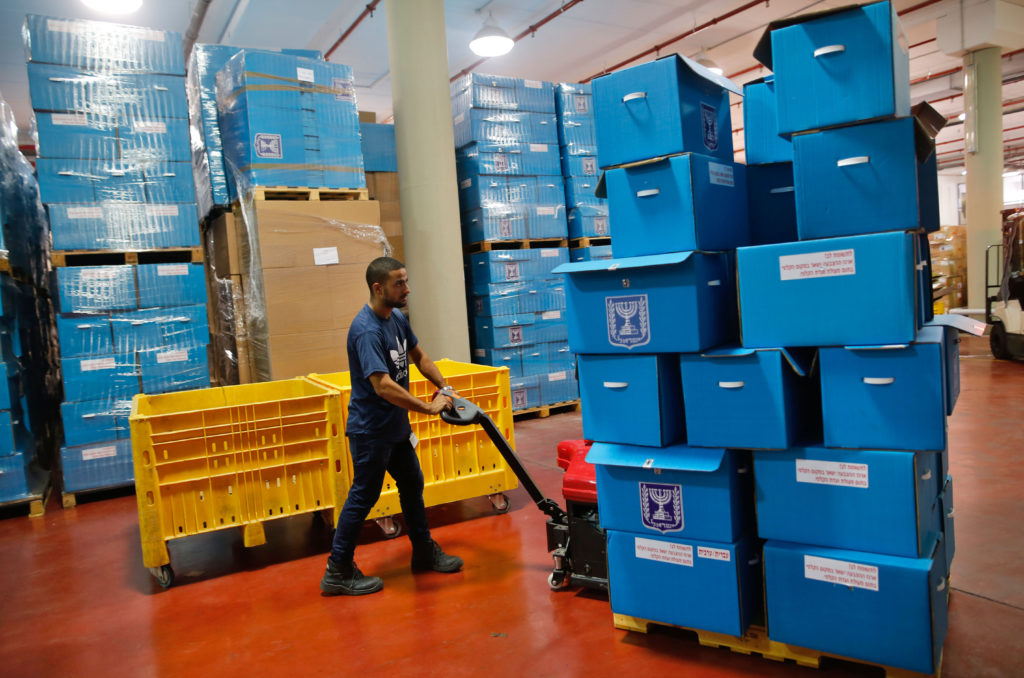Australia/Israel Review
Israel’s least ideological vote
Mar 12, 2021 | David Horovitz

For decades, when trying to simplify the presentation of survey data for Israel’s baffling array of parties during election campaigns, Israeli pollsters would divide the competing forces into two blocs – right-wing and left-wing. On one side, you’d have Likud and its satellite parties, which latterly included the ultra-Orthodox. On the other, you’d have Labor and its allies, including the Arab-dominated parties, which might be set off in a slightly different shade to show they wouldn’t actually be invited into the government.
That right/left, two-bloc chart fell apart after the elections in April 2019, however, when Avigdor Lieberman and his Yisrael Beitenu party shatteringly prevented Prime Minister Binyamin Netanyahu from forming the coalition he thought he had sewn up, and thus sentenced Israel to the second of what have turned out to be four (so far) quickfire election campaigns.
Lieberman was and is emphatically a man of the political right – a settler, a proponent of redrawing Israel’s boundaries to exclude some of its Arab citizens, a former Netanyahu aide and a minister in multiple Likud-led coalitions. There had been no doubt that Yisrael Beitenu belonged in that right-wing bloc. Except that, since its leader had deprived Israel and Netanyahu of a right-wing government, with devastating political consequences that reverberate to this day, it manifestly didn’t.
Unfazed, the pollsters soldiered on with their two-bloc summations. In the last two elections, they produced their familiar graphic, but with minor modifications – right-wing and ultra-Orthodox parties on one side; centre, left and Arab parties on the other; and that curious beast, Lieberman’s right-wing, anti-Netanyahu, anti-ultra-Orthodox Yisrael Beitenu, afforded a place of its own in the middle.
Now, though, in the run-up to election number four on March 23, the whole easy-to-follow two-bloc solution has melted down altogether. The cacophony of competing parties is certainly marked by the familiar left-right ideological differences. But the next Israeli government is unlikely to be assembled on the basis of affinity between similar-minded parties.
For these are shaping up to be the least ideological elections in Israeli history.
Israel’s big issues haven’t evaporated. Iran is closing in on the bomb. The army constantly faces threats on numerous other fronts. The Palestinians aren’t going anywhere. The settlement enterprise remains divisive. We have a relationship to nurture with a new US administration. A need to build better bridges with Diaspora Jewry. Domestic inequalities are widening. The social and cultural gulf between the ultra-Orthodox and the rest is yawning. And overshadowing everything right now is COVID-19.
There is no shortage of parties old and new competing for our support with policies on all these and other familiar issues; it’s just that they do not line up in potential coalitions on that basis. The question of right or left is, more than ever before, subservient to the only 2021 electoral divide that really matters: for- or anti-Netanyahu. Never mind whether a party’s ideology is similar to Likud’s on some or other key matters. It’s a matter, almost solely, of are you with him or against him.
This isn’t the fault of the pollsters, of course. And, undeterred, rather than ditching their familiar two-bloc system, they have thus far merely changed the labels. On one side, nowadays, they place Netanyahu’s Likud and its two dependable partners, the ultra-Orthodox parties Shas and United Torah Judaism. And on the other side, they group all the anti-Netanyahu parties, irrespective of their ideology, thus creating a graphic alliance of extraordinarily improbable political bedfellows, from ex-Likud minister Gideon Sa’ar’s New Hope party on the right, via Lieberman, across to Yair Lapid’s centrist Yesh Atid and Benny Gantz’s shrivelling Blue and White, and on to the reviving Labor party of Merav Michaeli, and thence to left-wing Meretz and finally the Arab parties.
What they’re quite sensibly showing us, in other words, is Netanyahu versus the rest. And in the middle slot that was invented for Lieberman in 2019, we now have the Yamina party – a firmly right-wing entity but one, nonetheless, whose leader Naftali Bennett is neither promising to serve alongside Netanyahu nor promising not to, and instead declaring that he has his eyes firmly set on the premiership himself.
The trouble with this latest graphic representation is that it still doesn’t quite capture what’s going on. Bennett might indeed turn out to hold the balance of power between the pro- and anti-Netanyahu forces when all the votes are in – but only if Likud, the ultra-Orthodox parties, and Yamina can muster at least 61 of the Knesset’s 120 seats between them. And that is something that our (rather unreliable) polls currently suggest is far from certain.
If, by contrast, the other bloc, the bloc whose only common denominator is the declared goal of ousting Netanyahu, has 61 or more seats, the pollsters’ graphic could prove highly misleading, in part because Netanyahu’s ostensible “natural allies,” the ultra-Orthodox parties that have stuck with him these past three elections, cannot be relied upon to stick with him again. If a Netanyahu-led alliance cannot win a Knesset majority, they have intimated that other permutations might be viable – including membership in a coalition alongside the likes of New Hope, Yamina and Yesh Atid.
Numerous other permutations could also come into play, including the very real possibility that, yet again, there’s no viable, stable coalition at all, and we are condemned to yet another… (Sorry, I cannot bring myself to complete that sentence.)






